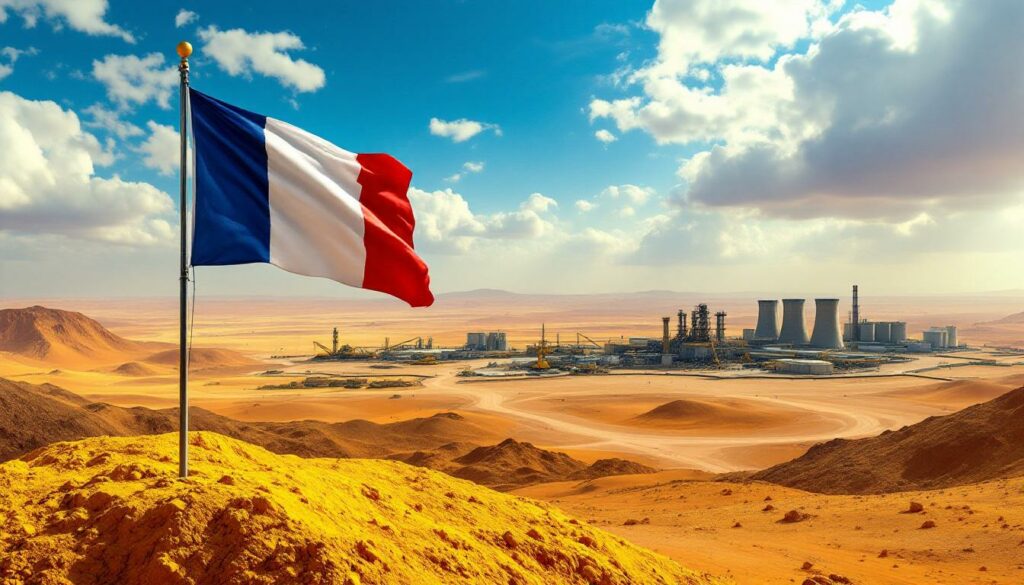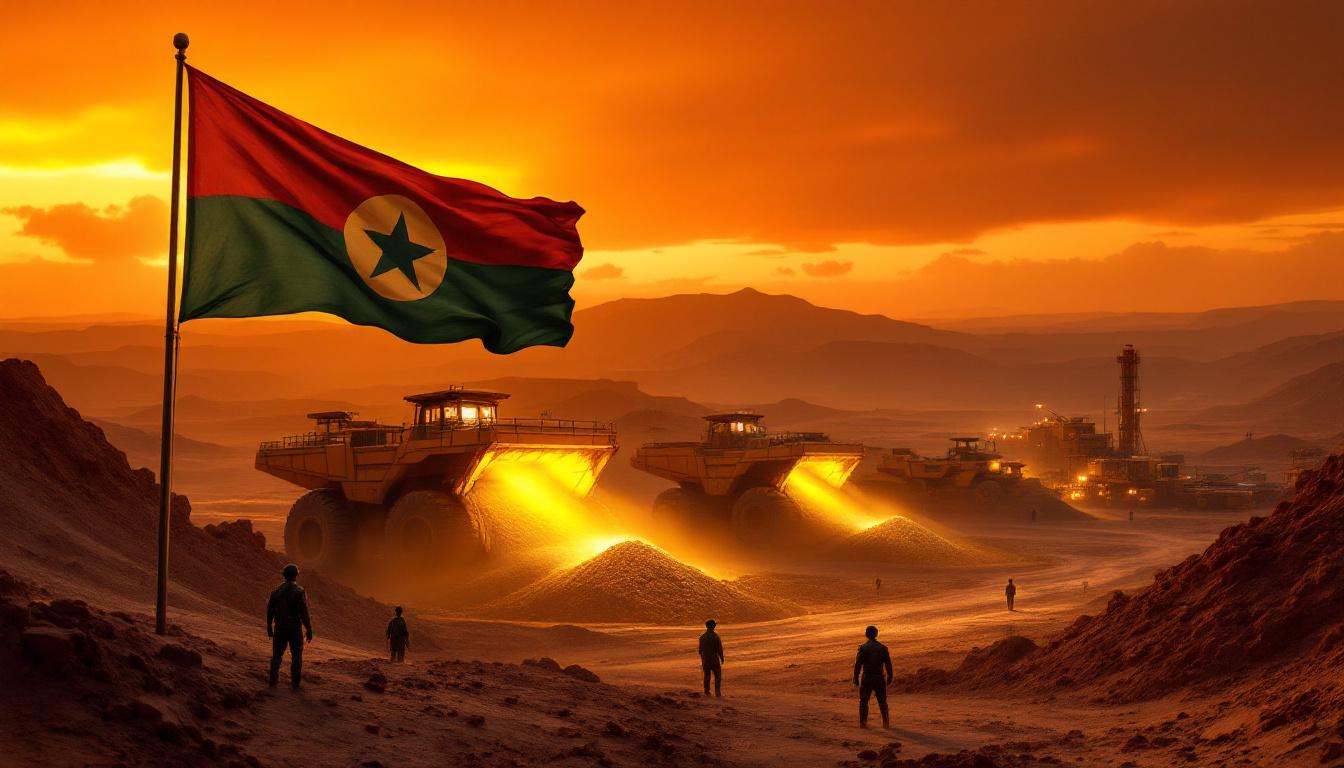Understanding the Niger-Orano Uranium Dispute: What's at Stake?
The French state-owned nuclear energy company Orano finds itself in a high-stakes dispute with Niger following the West African nation's announcement on June 20, 2025, to nationalize the Somair uranium mine. This development marks a significant turning point in the already deteriorating relations between Niger and France since Niger's military coup in 2023.
"Orano said on Friday it opposed Niger's planned nationalization of its Somair uranium mine," reported Reuters, highlighting the immediate corporate pushback against this resource sovereignty move. The timing of this announcement comes after what observers describe as "months of worsening relations between the French state-owned company and its local partners" in Niger.
What is the Somair Uranium Mine Nationalization Controversy?
The Somair uranium mine represents one of Niger's most valuable natural resources and has long been operated under a joint venture structure with Orano (formerly Areva) maintaining operational control. The mine is strategically positioned in Niger's uranium-rich northern region, where the country has developed a significant mining industry that accounts for approximately 5% of global uranium supply.
This nationalization effort doesn't occur in isolation but rather represents the culmination of shifting power dynamics following Niger's political transformation in 2023. The military junta that seized power has increasingly signaled intentions to reassert control over the nation's natural resources.
Key Facts About the Somair Mine
- Location and Production: Situated in Niger's Agadez region, Somair has been a cornerstone of Niger's mining sector since operations began in the 1970s
- Ownership Structure: A joint venture with Orano holding a majority stake and Niger's state mining company holding the remainder
- Economic Significance: Uranium exports contribute significantly to Niger's GDP and government revenue, with the mining sector representing over 40% of export earnings
- Strategic Importance: The mine supplies uranium critical to France's nuclear energy program, which generates approximately 70% of France's electricity
Disclaimer: The mining industry is subject to rapid regulatory and political changes. The information presented reflects the situation as of June 2025 and may evolve as negotiations progress.
How Did the Niger-Orano Relationship Deteriorate?
The deterioration in relations between Niger and Orano follows a clear timeline marked by political upheaval and changing resource governance philosophies.
Timeline of Escalating Tensions
- July 2023: Military coup in Niger ousts democratically elected President Mohamed Bazoum
- August-December 2023: New military government begins reviewing all foreign mining contracts
- January-March 2024: Initial signals of discontent with Orano arrangements surface in Nigerien state media
- April-December 2024: "Months of worsening relations" between Niger and Orano, as characterized by Reuters
- First half of 2025: Preliminary discussions about changes to ownership structure reportedly fail
- June 20, 2025: Niger announces nationalization plans; Orano immediately issues statement of opposition
This breakdown reflects a broader trend of changing attitudes toward resource extraction agreements throughout West Africa, where governments increasingly question arrangements established during earlier periods.
Political Context Behind the Dispute
The military junta that seized power in Niger has championed resource nationalism as a cornerstone of its economic policy. This stance resonates with a significant portion of the population who perceive historical mining agreements as disproportionately benefiting foreign companies.
"The deterioration represents more than just a business dispute – it symbolizes the recalibration of post-colonial economic relationships across the Sahel region," notes a Reuters analysis of the situation.
The tensions also reflect Niger's changing geopolitical alignment, with the military government distancing itself from traditional Western partners like France while strengthening ties with Russia and China, both of which have shown interest in the country's mineral resources.
Why Does This Dispute Matter for Global Uranium Markets?
The nationalization of the Somair mine carries significant implications for the global uranium market, which has already experienced uranium market volatility due to geopolitical tensions and shifting energy policies.
Strategic Importance of Niger's Uranium
Niger ranks as the world's seventh-largest uranium producer, with its output playing a crucial role in the global supply chain. The country's uranium reserves are estimated at approximately 7% of the world's known recoverable resources, making Niger a significant player in the nuclear fuel cycle.
For context, the global uranium market is relatively concentrated, with just ten countries accounting for over 90% of production. Any disruption from a major producer like Niger can have disproportionate effects on market stability and pricing.
Top Uranium Producing Countries (2024 estimates)
| Rank | Country | Production (tonnes U) | % of Global Supply |
|---|---|---|---|
| 1 | Kazakhstan | 21,500 | 41% |
| 2 | Canada | 7,000 | 13% |
| 3 | Australia | 6,500 | 12% |
| 4 | Namibia | 5,700 | 11% |
| 5 | Uzbekistan | 3,500 | 7% |
| 6 | Russia | 2,900 | 6% |
| 7 | Niger | 2,600 | 5% |
| 8 | China | 1,900 | 4% |
| 9 | Ukraine | 800 | 2% |
| 10 | India | 400 | <1% |
Market Implications
The market response to Niger's nationalization announcement has been immediate, with uranium spot prices showing increased volatility. Analysts predict several potential implications:
- Supply Chain Disruption: Any transition period during nationalization could temporarily reduce output from the Somair mine
- Investor Confidence: The move may trigger reassessment of political risk in uranium investment insights
- Price Volatility: Uncertainty about Niger's production could drive short-term price increases, particularly if operational disruptions occur
- Strategic Stockpiling: Nuclear utilities may accelerate uranium purchases to hedge against future supply uncertainties
Market Analysis Disclaimer: Predictions about commodity price movements involve significant uncertainty. Investors should conduct their own research before making investment decisions based on geopolitical developments.
Historically, similar resource nationalization efforts have led to temporary production declines as management transitions and operational practices adjust. The uranium market, with its relatively inelastic demand driven by nuclear power plants' fuel needs, is particularly sensitive to supply disruptions.
What Legal and Diplomatic Challenges Does the Nationalization Present?
The planned nationalization of the Somair mine creates a complex legal landscape that will likely require international arbitration and diplomatic engagement.
International Investment Protection Issues
Orano's opposition to the nationalization plan signals the beginning of what could be a protracted legal battle. The company's investments in Niger are potentially protected by bilateral investment treaties between France and Niger, which typically include provisions regarding:
- Fair and equitable treatment of foreign investments
- Compensation requirements for expropriation or nationalization
- Dispute resolution mechanisms through international arbitration
The legal framework governing the dispute will center on several key questions:
- Whether Niger's actions constitute lawful expropriation or unlawful taking
- What compensation methodology should apply (book value, fair market value, or future earnings potential)
- Which international tribunals have jurisdiction (ICSID, ICC, or other forums)
- How existing contractual protections interact with sovereign rights
Diplomatic Ramifications
Beyond the legal arena, this dispute has significant diplomatic implications for France-Niger relations, which have already deteriorated following the 2023 coup.
The French government, as Orano's majority owner, may engage diplomatically to protect its strategic interests in Niger's uranium sector. This could include:
- Bilateral negotiations between French and Nigerien officials
- Multilateral pressure through organizations like the African Union or ECOWAS
- Economic leveraging through trade relationships and development assistance
- Coordination with other uranium-importing nations concerned about supply security
The diplomatic approach will require balancing France's commercial interests with recognition of changing sovereignty expectations in West Africa. Historical precedents suggest that successful resolutions often involve compromise arrangements that preserve operational continuity while acknowledging host country sovereignty concerns.
How Might This Affect Other Mining Operations in Niger?
The Somair mine nationalization could have cascading effects across Niger's broader mining sector, which includes not only uranium but also gold, coal, and other minerals.
Precedent for Other Foreign Mining Companies
Foreign investors operating in Niger's mining sector are likely watching the Orano situation closely as an indicator of their own future treatment. Companies will be evaluating:
- Contract security: Whether existing agreements will be honored or subject to similar nationalization efforts
- Investment returns: How compensation mechanisms function in practice if assets are nationalized
- Operational continuity: Whether technical expertise is maintained during ownership transitions
- Community relations: How nationalization affects local employment and development programs
Mining companies typically incorporate political risk assessments into investment decisions, and Niger's move may trigger industry-wide recalibration of risk premiums for projects in the country.
Broader Regional Implications
The Somair nationalization represents part of a wider trend of resource nationalism across the Sahel region and Africa more broadly. Similar movements have emerged in:
- Mali: Reviewing mining contracts following its own military takeover
- Burkina Faso: Increasing state participation requirements in mining projects
- Tanzania: Implementing significant mining code reforms to increase government revenue
- Guinea: Revisiting agreements in its bauxite sector
This regional pattern suggests a fundamental shift in how resource-rich African nations approach extraction agreements with multinational corporations. The outcomes in Niger could influence approaches taken by neighboring countries facing similar pressures to maximize resource benefits.
What Are the Possible Outcomes of This Dispute?
While the nationalization announcement represents a dramatic development, historical precedents suggest several potential resolution pathways.
Negotiation Scenarios
Based on similar cases globally, several potential outcomes might emerge:
- Full Nationalization: Complete transfer of ownership to the Nigerien state, with negotiated compensation to Orano
- Partial Nationalization: Increased Nigerien ownership stake while maintaining Orano's operational involvement
- Contract Renegotiation: Revised terms that preserve Orano's ownership but increase revenue flows to Niger
- Operational Partnership: Technical service agreement where Orano provides expertise to a state-owned entity
- Status Quo with Modifications: Minor adjustments to existing arrangements following diplomatic pressure
The most successful resource nationalization cases typically involve phased transitions that preserve operational expertise while training local talent to eventually assume greater control. This balances immediate sovereignty gains with practical operational realities.
Economic Consequences for Niger
Niger's economic future depends significantly on how the nationalization process unfolds. Key considerations include:
- Technical Capability: Whether Niger can maintain production levels without Orano's expertise
- Investment Climate: How the move affects foreign investment in other sectors
- Revenue Management: Systems for transparently handling increased state mineral revenues
- Employment Impacts: Effects on local communities dependent on mine operations
- International Support: Access to development financing following nationalization
Potential Economic Scenarios for Niger
| Scenario | Short-Term Impact | Long-Term Outlook |
|---|---|---|
| Smooth Transition | Temporary production decline, compensated by higher state revenue share | Sustainable operation with gradual capacity building |
| Disrupted Operations | Production shortfalls, revenue loss, employment reduction | Rehabilitation costs, difficulty attracting technical partners |
| Negotiated Partnership | Minimal disruption with phased knowledge transfer | Balanced approach combining sovereignty with operational stability |
Economic Analysis Disclaimer: Economic projections involve numerous variables and uncertainties. Actual outcomes depend on implementation details and external market factors.
How Does This Fit Into Global Resource Nationalism Trends?
The Niger-Orano dispute represents one example within a broader global trend of resource-rich nations reasserting control over their natural resources.
Growing Resource Sovereignty Movements
Resource nationalism has emerged as a significant force in global mining over the past decade, with different approaches across regions:
- Latin America: Venezuela, Bolivia, and Ecuador have implemented various nationalization programs
- Central Asia: Kazakhstan has increased state participation requirements in strategic minerals
- Southeast Asia: Indonesia implemented export bans to encourage domestic processing
- Africa: Multiple countries have revised mining codes to increase state benefits
These movements share common motivations despite different implementation approaches:
- Desire to capture greater value from national resources
- Public pressure to address perceived historical inequities
- Political advantages of championing national resource control
- Need for increased government revenue from natural resources
Comparison With Other Mining Nationalization Cases
Historical mining nationalizations provide important context for understanding potential outcomes in Niger:
Chile (1971): The nationalization of copper mines eventually led to the creation of Codelco, one of the world's largest copper producers, though the transition involved significant production disruptions.
Zambia (1969-1974): Copper mine nationalization initially succeeded but later faced challenges from declining copper prices and underinvestment.
Bolivia (2006-2007): Nationalization of hydrocarbon resources increased government revenue but led to reduced foreign investment in exploration.
Indonesia (2014-2017): Rather than full nationalization, Indonesia implemented export restrictions and divestment requirements that eventually resulted in compromise arrangements with major mining companies.
The most successful cases typically involve:
- Phased implementation rather than abrupt ownership changes
- Preservation of technical expertise through transition periods
- Clear compensation frameworks that acknowledge investment value
- Transparent revenue management systems that benefit citizens
What Are the Implications for Nuclear Energy Supply Chains?
The Somair mine situation highlights vulnerabilities in global nuclear fuel supply chains that could have far-reaching consequences for energy transition security.
Security of Uranium Supply
Nuclear power plants require reliable, long-term fuel supply arrangements due to their operational characteristics. The Somair situation raises several supply security concerns:
- French Vulnerability: France derives approximately 70% of its electricity from nuclear power, making uranium supply security a national priority
- Utility Planning: Nuclear operators typically maintain 2-3 year fuel inventories but rely on stable supply for long-term operations
- Contract Disruption: Many utilities have long-term supply contracts that could be affected by ownership changes
- Substitution Limitations: Unlike other commodities, uranium supply chains involve specialized processing that limits quick supplier switching
This situation underscores the strategic nature of uranium resources in an era of increasing focus on energy security alongside decarbonization.
Strategic Responses by Nuclear Energy Producers
Countries and utilities dependent on uranium imports are likely to implement several risk mitigation strategies:
- Diversification: Accelerating efforts to secure uranium from multiple geographic sources
- Strategic Reserves: Increasing inventory levels to buffer against supply disruptions
- Investment in Alternative Sources: Supporting exploration and development in politically stable jurisdictions
- Fuel Technology Innovation: Advancing technologies that improve uranium utilization efficiency
- International Coordination: Strengthening multilateral frameworks for nuclear fuel security
Uranium Supply Risk Mitigation Strategies
| Strategy | Implementation Timeframe | Effectiveness |
|---|---|---|
| Geographic Diversification | Medium-term (1-3 years) | High (reduces country-specific disruption risk) |
| Strategic Stockpiling | Short-term (immediate) | Medium (temporary solution with storage costs) |
| Advanced Fuel Technologies | Long-term (5-10 years) | High (potentially reduces uranium requirements) |
| Recycling/Reprocessing | Medium-term (3-5 years) | Medium (requires specialized facilities) |
| Supply Chain Transparency | Short-term (1-2 years) | Medium (improves risk assessment capabilities) |
Energy Security Disclaimer: Energy supply security assessments involve complex geopolitical factors beyond market considerations. National policies may prioritize security over pure economic efficiency.
FAQ: Niger-Orano Uranium Dispute
What percentage of Niger's economy depends on uranium mining?
Uranium mining contributes approximately 5% to Niger's GDP directly, but its importance extends beyond this figure through indirect economic effects. The sector represents over 40% of Niger's export earnings and provides significant formal employment in a country where the majority of workers are engaged in subsistence agriculture.
How might this nationalization affect uranium prices globally?
Market analysts suggest the nationalization could contribute to upward pressure on uranium prices, particularly if production is disrupted during the transition period. However, the impact may be moderated by existing utility inventories and the relatively small share (approximately 5%) that Niger represents in global production. Price effects will largely depend on operational continuity at the mine and market perception of supply risk.
What options does Orano have to challenge the nationalization?
Orano has several potential avenues to challenge Niger's nationalization plan:
- International arbitration through mechanisms like ICSID (International Centre for Settlement of Investment Disputes)
- Diplomatic engagement via the French government
- Direct negotiation with Niger's government for acceptable compensation
- Legal challenges based on bilateral investment treaties between France and Niger
- Operational leverage related to technical expertise required for mine operations
The most likely approach involves parallel legal proceedings while maintaining negotiations for a potential compromise solution.
Has Niger nationalized mining assets before?
While Niger has adjusted mining agreements and increased state participation requirements in the past, the planned Somair
Want to Capitalise on the Next Major Mineral Discovery?
Discover why significant mineral finds can lead to exceptional market returns by exploring Discovery Alert's dedicated discoveries page, where the proprietary Discovery IQ model delivers real-time alerts on ASX mineral discoveries, turning complex data into actionable investment insights. Begin your 30-day free trial today at https://discoveryalert.com.au/discoveries/ to position yourself ahead of the market.




